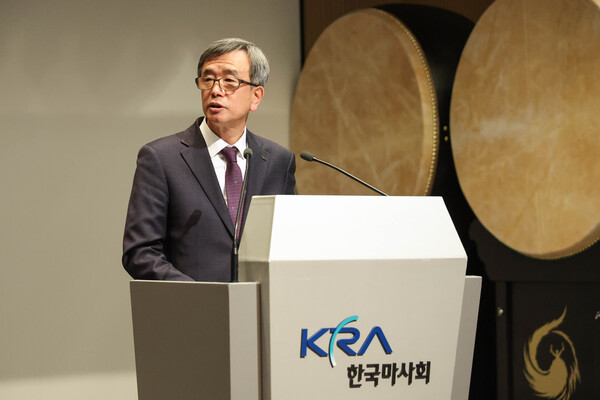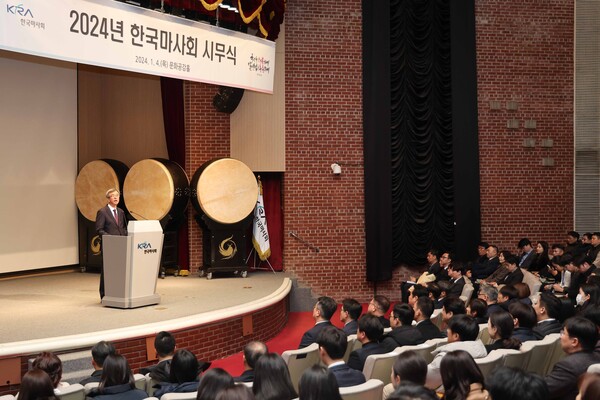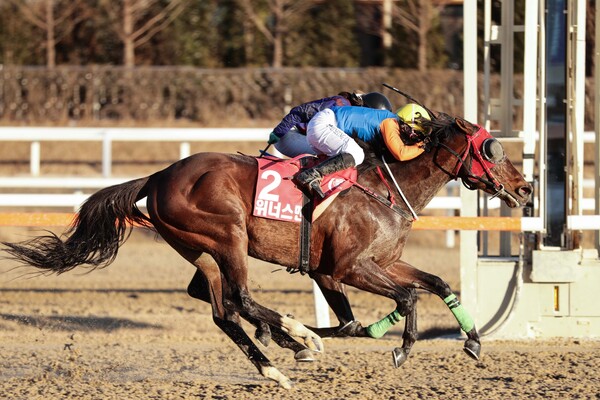CEO Kim Hong-ki of the Korea Racing Authority eyes:
By Feature Editor Kim Hyung-dae
The Korea Racing Authority (KRA) has recently announced its 2024 Racing Implementation Plan, which aims to improve the quality and festivalization of horse racing in Korea.
The KRA announced its 2024 Horse Racing Implementation Plan ahead of the first race of the Year of the Dragon, which will be held on May 5 this year.

Korean horse racing has done well last year rising above the long downturn caused by COVID-19 pandemic.
In 2024, the New Year will begin in real earnest with tasks to improve the quality and festivalization of horse racing, such as enhancing the selection system for the best horses and implementing night races twice a year.
First, night races will be held twice a year in conjunction with the Cherry Blossom Festival in spring and the Korea Cup in fall. As Let's Run Park is gaining popularity as a nighttime cherry blossom spot, with more than 200,000 visitors, we will contribute to the festivalization and health of horse racing by providing opportunities for event visitors to participate in horse racing.

In addition, in order to lay the foundation for a seasonal horse racing system, major grand prix races will be held between March and November.
As a result, the year's representative horse and the best domestic horse will be selected based on the cumulative points up to the 5th week of November, the end of the Grand Prix. In addition, the plan is to revitalize the overseas expeditions of the best domestic horses by expanding incentives for winning overseas races and imposing rating caps on Grade 1 races in January, February and December.
The Korea Cup (IG3, totaling 1.6 billion won) and Korea Sprint (IG3, totaling 1.4 billion won), which significantly increased their prize money last year, will maintain their prize money this year.
Now in their seventh year, the Korea Cup and Sprint are driving the internationalization of Korean horse racing. This year, the KRA will distribute ranking prizes up to 10th place to encourage the participation of better overseas horses.
In addition, incentives will be created for horses in the lower grades (grades 4-6) over 1,600 meters to mitigate the short-distance bias and discover a variety of distance aptitudes.

Incentives will also be awarded to horses that break records in the 1,200-meter and 1,800-meter races in the higher grades to strengthen the attributes of horse racing as a speed sport.
In addition, Seoul, Bukyeong, and Jeju will be aligned on Wednesday mornings to maximize predictability and provide customers with early race information, including the implementation of entry registration for Grade 6.
President Kim Hong-ki of the KRA said: "2023 was a year of rebirth for the Korean horse racing and equine industry after a prolonged downturn due to COVID-19, thanks to the support of many customers.”
Chief Executive Officer Kim said: "What we have seen over the past time is the strength to survive even in the face of a major crisis, and what we need to aim for in the future is innovation and sustainability towards global standards." "We will build Korean horse racing as a K-Sport that can be enjoyed not only by domestic horse racing fans but also by overseas fans through exciting and high-quality races," he said.
Korean horse racing is actively keeping pace with the megatrend of online and offline convergence, such as online bookmaking and mobile-responsive web service 'eRace of the Day', which is scheduled to be officially operated in June. It is expected that 2024, which will be decorated with new changes and records, will be a new turning point in Korean horse racing.

